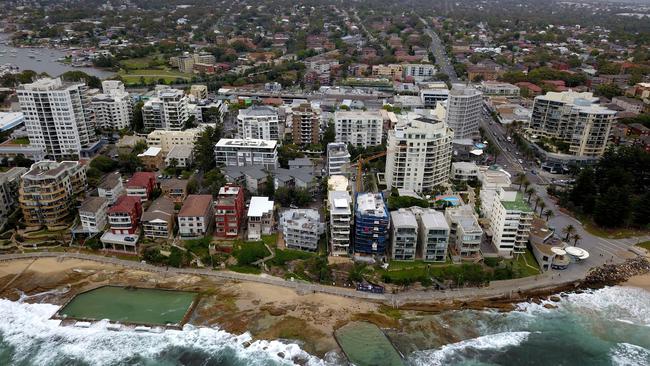Property slide could produce $800bn wealth hit
Warning consumers will shut their wallets as Sydney property price falls hit levels not seen for decades.

Sliding house prices across the country could spark a $800 billion wipe-out in household wealth, which economists warn will crimp economic growth as consumers shut their wallets.
The warning, from Australia and New Zealand economist for Capital Economics, Ben Udy, comes as Sydney house prices posted their largest annual decline in 35 years.
According to new figures from CoreLogic, Sydney dwelling values slumped 8.1 per cent over the past year, the biggest yearly fall since May 1983.
Sydney’s housing market is down 9.5 per cent since peaking in July last year, which is on track to eclipse the previous record peak-to-trough decline set during the last recession. Between 1989 and 1991, during Paul Keating’s “recession we had to have” values fell 9.6 per cent.
Melbourne has experienced a fall of 5.8 per cent since its peak in November 2017.
The figures also show national dwelling values fell 0.7 per cent in November, led by larger falls in Sydney of 1.4 per cent and 1 per cent falls in Melbourne. National house prices across the eight capital cities are now down 6 per cent from the July 2017 national peak.
The falls in Sydney and Melbourne, which account for about more than half all the nation’s homes, was the weakest month-on-month change in dwelling values since the Global Financial Crisis.
“We suspect the decline in house prices in the eight capital cities is going to continue and house prices will go on to eventually fall by at least 12 per cent,” Mr Udy said.
“And we don’t think the falls in prices will be ending anytime soon,” he said.
“Our forecasts for house prices imply that housing wealth may eventually decline by as much as $800 billion,” he said.
“By reducing annual consumption growth, we think this will lower annual GDP growth by 0.3 percentage points in each of the next three years. This is one reason why we think GDP growth will slow from 3.2 per cent this year to 2.5 per cent by 2020.”
The continued slide in property prices will likely be exacerbated as smaller lenders look to increase interest rates for a second or third time this year, as higher funding costs force banks to slug customers with higher repayments.
Australia’s fifth largest bank, ING Direct, has announced a 10 basis point rate increase for new borrowers, after hiking rates on existing mortgage holders in September. Teachers Mutual Bank is slugging all customers with a 20 basis point hike.
Along with steadily rising interest rates, house prices have been dampened after restrictions were placed on investor lending and riskier loans and as banks more stringently apply responsible-lending laws after being shamed for loose standards at the banking royal commission.
CoreLogic head of research Tim Lawless said downward pressure on prices is largely confined to Sydney and Melbourne, which combined hold 55 per cent of the market by value.
“Additionally, housing affordability constraints are more pronounced in these markets and rental yields are substantially lower, indicating an imbalance between rental values and dwelling values,” Mr Lawless said.
“The ramp-up in housing supply has been more pronounced in these markets against a backdrop of slowing demand, and Sydney and Melbourne have also been more affected by the reduction in foreign buying activity.”
The price corrections are creating divergent property markets across the country
CommSec’s latest Economic Insights report agrees, arguing it is incorrect to talk of a nationwide slump in home prices.
Outside the Sydney and Melbourne bubbles, house prices were up on last November’s result in four of the eight capital cities in November. Prices increased most in Hobart, up 9.3 per cent, Canberra rose 4 per cent, Adelaide went up 1.4 per cent, and Brisbane recorded a 0.3 per cent increase, according to CommSec data.




To join the conversation, please log in. Don't have an account? Register
Join the conversation, you are commenting as Logout